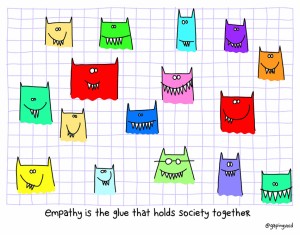All you need to do to transform failure to success is to adopt my personal #1 SECRET – the one principle that makes the greatest difference to long-term, sustainable fundraising success.
This is a secret that will transform donor loyalty and increase donor retention by leaps and bounds.
Plus, it’s not rocket science. It’s pretty much common sense.
Anyone can do it. Everyone should do it.
I’m going to share that principle here; then I’m going to turn this principle into a word – actually three variations of the same word – that you can use to transform the way you’ve been doing business.
What will happen as a result?
I promise you’ll close more major gifts!
Are you ready?
Okay. Don’t just shine this on. I promise if you give this some serious thought it will make some serious difference in your results.
At first, it may seem like just a little tweak. But little tweaks add up. They can soon become second nature, and a whole new modus operandi — from whence great changes can arise.
So… get out your tweaking sticks and let’s make some beautiful music together.
DRUMROLL…
The principle that will change your life, should you choose to embrace it, is…
EMPATHY!
Let me explain.
Because the real usefulness of empathy lies in how you apply it on a daily basis.
And, since for purposes of this article we’re talking about the role of empathy in major gift fundraising, I’ll explain to you fully how I use it to build lasting major donor relationships.
Here is the BIG SECRET:
 Empathy Translates to: Feel, Felt, and Found
Empathy Translates to: Feel, Felt, and Found
Overcome objections with empathy.
“I understand” is your greatest friend. Not all prospects immediately agree to commit. Don’t argue with them. Agree with them. Say “I understand exactly how you feel, and… I’ve felt that way myself… and what I’ve often found is…”
- Feel: When you use the word “feel” you show them you heard them. You feel for them. You feel their pain.
- Felt: When you use the word “felt” you empathize with them by drawing on a similar experience in your life.
- Found:When you use the word “found” you show them another path by returning the conversation to the need; to your heart, and theirs. If they feel they can’t commit, find out why. Then, gently reframe the conversation to potentially show them ways they might be able to participate. Ways you’ve found to deal with a similar situation.
Here are a few examples:
I have two kids in college/am supporting parents/have medical expenses.
Wow, I really feel for you. It looks like you do have a full plate. We appreciate what you’ve been doing. I understand if the amount I’ve requested for this special effort is not manageable right now. Honestly, I get it. I’ve felt similarly (explain some of your additional expenses right now). Yet, even so, I’ve made an increased gift this year. Why? Because I believe our community really needs an institution like [your organization], especially to help folks with these very types of expenses. I’ve found I can do this (maybe at a bit lower level than I’d like), and that I feel good about it because our community needs a resource like this one. One we can all rely on, in good times and bad (You are inviting investment by example).
My giving priorities have changed/I gave to the ____ Crisis Appeal.
I understand. ________ is a really worthwhile cause and it’s wonderful that you lent your support. I can see how you feel the way you do. I felt that way too. Then I found out that [your organization] actually has a number of programs of which I was not aware – programs that are also here for people during times of crisis (describe the program or programs). I found that it made a lot of sense to give a thoughtful gift to the crisis appeal, and to also give a passionate gift here, in our own backyard. People need help everywhere, of course. Yet I know you’ve been a long-time supporter here and I hope we can continue to count on your caring and leadership support. It truly means a lot!
I’m not feeling positive about the [your organization] leadership.
I can understand how you feel uncertainty while we go through a leadership transition. I’ve felt that way too in the past. But then I found that what I really cared about is the role this organization plays, which goes well beyond any one person at any one point in time. I would hope you still support the mission and the important work [your organization] achieves in our community. Leadership may come and go, but we all want to assure that our organization will always be here for people who rely on us.
Empathy is Not a Trick.
Empathy is an underestimated human characteristic.
This is something Charles Darwin understood when he posited his theory of survival of the most empathic. Sadly, Darwin became known for “survival of the fittest,” yet that term was really coined by Herbert Spencer. Darwin did not connote “fitness” so much with physical strength and fighting as he did with empathy and caring. In fact, he found the most “fit” communities were the most empathic ones — the ones that cared for their members.
In this regard, empathy is a vastly underrated fundraising tool and skill.
As with any other skill, empathy must be practiced to be effective.
For some it comes more naturally than others. But everyone can do it.
Empathy is a survival skill.
The psychologist John Marshall Roberts makes the case for empathy in this TED talk: “The Global Urgency of Everyday Empathy.” Take a listen. I think you’ll be inspired. (You may be a bit saddened as well, as this talk occurred nine years ago — and empathy seems needed more today than ever).
Roberts talks about how lack of empathy causes all sorts of bad, and costly, outcomes. He states: “It will be an absolute survival skill for the 21st century.” So, whether you’re a major gift fundraiser or not, you may as well get started if you want to help move people, and the world, to a better place.
- Manipulation fails.
- Ranting fails.
- Anger fails.
- Empathy works.
Empathy is the antidote to cynicism and negativity.
It’s the way to build authentic bridges of human understanding.
How to Employ Empathy to Close Major Gifts
You must be genuine.
You must truly listen and be open.
You must be willing to step into another’s shoes, and be willing to look at the world from their perspective.
You can’t downplay how your donor is feeling in any given moment.
You can’t tell them not to feel that way.
You can offer a listening ear, a supportive shoulder and an alternative perspective.
Sometimes they’re ready and willing to embrace a new point of view. Sometimes not.
Though you may not always get the response you want today, tomorrow always comes.
When it does, your donor will remember you were there for them.
That’s how you build a sustainable relationship.
That’s how you avoid closing the door.
Learn to Use this Secret Asking for Major Gifts

You can’t afford not to ask for major gifts!
Feel, Felt and Found works especially well when meeting with donors face-to-face to make a major gift ask. Get lots more major gift fundraising secrets in my most popular online course: Winning Major Gifts Fundraising Strategies for the small to medium-size shop. Whether you’re new to major gifts or are simply seeking to do a more effective job, this course will help you with lots of hands-on practical advice. Everything you need is here — from A to Z — in one, nice, tied-together package. I promise: All the materials from this course will become your ‘go to’ fundraising resource — a reference you will turn to for years to come.
Please contact me if you have any questions about whether this course may fit your needs. I’m happy to chat!
Please note there’s a generous “Early Bird” discount if you register before midnight PDT on August 10th. So… go for it now!
And, yes, there are CFRE continuing education credits.
Images courtesy of Hugh MacLeod, Gaping Void, and Freedigitalphotos.net






